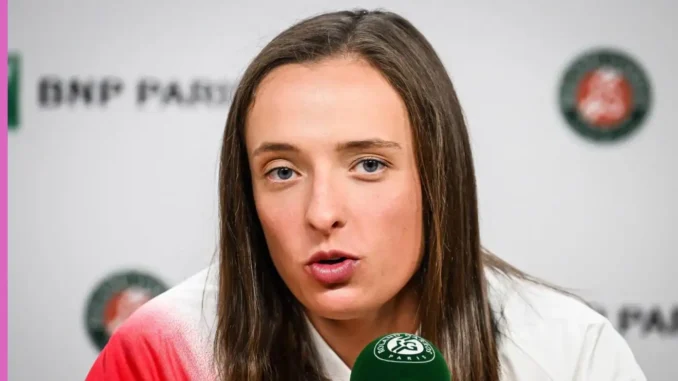
In a gripping semifinal clash at Roland Garros, Iga Swiatek, the four-time French Open champion, saw her remarkable 26-match winning streak at the tournament come to an abrupt end against world No. 1 Aryna Sabalenka. The intense battle, which unfolded on Court Philippe-Chatrier, concluded with a 7-6(1), 4-6, 6-0 scoreline in favor of Sabalenka, marking a significant moment in their storied rivalry. Swiatek, known as the ‘Queen of Clay,’ faced a packed press room afterward, where she candidly dissected her performance, expressed frustration over a controversial umpire decision, and outlined her plans for the future, all while maintaining a reflective perspective on her 2025 campaign.
The match was a rollercoaster of momentum swings, with 11 breaks of serve in the first 15 games showcasing the relentless pressure both players exerted. Swiatek, who had trailed 4-1 in the opening set, fought back to lead 5-4 but faltered in the tiebreaker as Sabalenka’s power took over. “She didn’t doubt. She just went for it,” Swiatek said of Sabalenka’s aggressive approach, particularly in the first set’s tiebreaker. After a lengthy locker room break, Swiatek returned revitalized, breaking early in the second set to level the match. “I should have had better intensity in the beginning of the second set,” she admitted, noting how she regained her focus to push the match to a decider. However, the third set saw Swiatek unravel, suffering a rare 6-0 defeat, a scoreline that stunned fans and marked her first ‘bagel’ at Roland Garros since 2019.
When pressed on what went wrong in the third set, Swiatek pointed to a combination of physical and tactical challenges. “I remember missing two backhands when she broke me first time. She still served really well. I feel like I served the same, and she read my serve much better,” she explained. The 24-year-old Pole acknowledged Sabalenka’s aggressive play, noting, “I think it’s more physical. She really went for it.” Swiatek’s serve, a known vulnerability this season, came under relentless pressure from Sabalenka, who stood close to the baseline to attack returns. “I lost my intensity a bit, and she just played, you know, like pretty strong as she did in the first set, but I didn’t react to that well and just couldn’t push back,” Swiatek added, reflecting on her inability to counter Sabalenka’s dominance in the decider.
A contentious moment arose in the second set when Swiatek, leading 4-2, requested chair umpire Kader Nouni to inspect a mark on Sabalenka’s serve, which she believed was out. The umpire declined, a decision Swiatek found unfair. “I want him to come down, but he didn’t. So I don’t think that was fair, especially when he came down, like, every time Aryna asked him to. I don’t get it, but I don’t really care,” she said, her frustration evident but tempered by her focus on moving forward. The incident, while not decisive, highlighted the absence of electronic line calling at Roland Garros, a point of contention for many players.
Despite the disappointment, Swiatek remained philosophical about her tournament performance. “It wasn’t a bad tournament, but obviously, yeah, not the result I wanted,” she told reporters. “Well, I played some quality matches. Now is probably not the best time to look at the wider perspective. Yeah, so probably wasn’t a bad tournament.” Her journey to the semifinals included a stirring comeback against Elena Rybakina in the fourth round, a match that reignited her confidence after a challenging clay season where she failed to reach a final in Stuttgart, Madrid, or Rome. “I love playing here, so for sure I’m happy that I was fortunate enough to play so many great tournaments here. Even this one, I played better than weeks before,” she said, emphasizing her affection for Roland Garros, where she has won 40 of 42 career matches.
Looking ahead, Swiatek outlined her plans for the grass court season, a surface where she has yet to win a title and struggled in 2024 with a third-round Wimbledon exit. “I’m going to have a few days off, but the coaches will plan that,” she said. “Hopefully, we’re going to have some decent kind of little preseason on grass, because it’s always been pretty hard to have that, especially when I want to be at home for a little bit. But I don’t feel like I need to be home right now, so maybe I’ll go somewhere in Europe to practice.” Her determination to adapt to grass, despite its challenges, reflects her commitment to evolving her game.
Swiatek’s 2025 season has been a turbulent one, marked by a doping ban for a contaminated medication, a coaching change, and a slide to No. 7 in the rankings. Yet, her performance in Paris showed glimpses of the form that made her a clay-court juggernaut. “For sure it’s going to be a tough match,” she had said of facing Sabalenka, acknowledging the challenge of their rivalry, which has pushed both players to new heights. As Swiatek prepares for Wimbledon, her focus is clear: regroup, refine, and reclaim her place at the top.
Leave a Reply